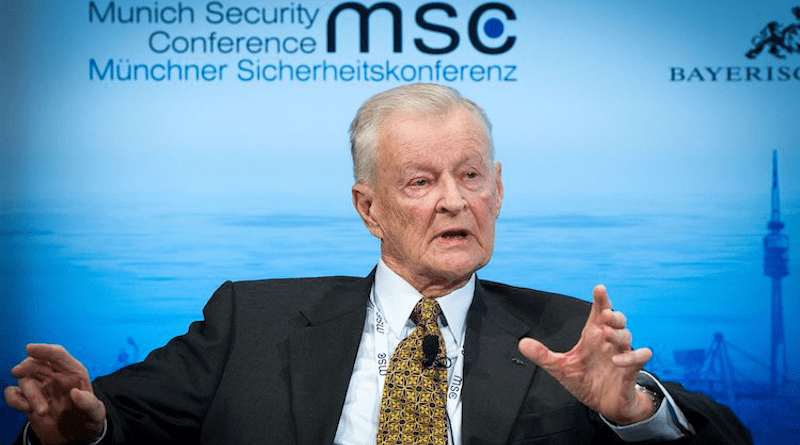Ukraine Should Have A Policy Of ‘Non-Involvement With NATO’, Opined Zbigniew Brzezinski – OpEd
By IDN
By Jonathan Power*
The truth is this whole Russian-Ukrainian-Western confrontation could be largely solved if the Ukrainian and Western sides wrote on paper that they don’t want to see Ukraine in NATO. This is the key issue for Russia. But it must be written down. Moscow no longer trusts verbal understandings that can be broken, as when the Reagan and Bush (Senior) Administrations gave President Mikhail Gorbachev the distinct impression that the US would not take advantage of the Soviet Union now that the Cold War was over, but it did.
President Bill Clinton provocatively began the expansion of NATO which has now reached right up to Russia’s borders. Gorbachev too innocently believed the Cold War was totally over and the US would never contemplate such a move. On Crimea, ideally Russia should agree to a new UN-supervised referendum. But as far as I can tell, unity with Russia is widely welcomed among Crimeans, so a bit of realpolitik by the West—shelving the issue- wouldn’t go amiss.
As for the dissident Donbas enclave, it has been anti-reform, anti-Western, pro-Russian since Ukraine’s independence. Allow it to secede and then watch. Donbas is paying a steep price for its effort to wrench itself away from Ukraine—80% of its industrial production has fallen and coal mines, factories, the airport, and other infrastructure have been badly damaged. Let economically pressed Russia bear the burden of this, plus paying the pensions, social provisions and the water and electricity that needs to be imported from Ukraine.
Important strategic political thinkers in the US have made it clear that present Western policy towards Russia is flawed. The late George Kennan, architect of Cold War containment, warned that to expand NATO would result in “a new Cold War, probably ending in a hot one”.
As I found in Moscow, during my recent visits, nuclear war doctrines are being dusted off by a regime which has no experience of how to deal with the art of nuclear brinkmanship. In his recent speech Putin has seemingly threatened their use.
Zbigniew Brzezinski, a former US presidential national security advisor, said not long before he died that Ukraine should have a policy of “non-involvement with NATO”—as Finland practices and did during all the years of the Cold War. Finland kept its geopolitical distance from the West while, at the same time, forging a strong democracy and close Western economic links.
Brzezinski told me that Russia is in the process of trying to regain its own national pride after the shattering of the USSR. He was optimistic for the future, despite the difficult problems that Ukraine posed. (I knew Brzezinski as well as any journalist. My latest long interview with him can be found in Prospect magazine.)
Henry Kissinger, a former Cold War warrior, now the senior emeritus American statesman, has written on a number of occasions that “the West must understand that, to Russia, Ukraine can never be just a foreign country. Russian history began with Kievan-Rus. The Russian religion spread from there. Ukraine has been part of Russia for centuries. The Russian Black Sea Fleet—Russia’s means of projecting power in the Mediterranean—is based in Sevastopol, Crimea (with Ukraine’s longtime agreement)”.
Kissinger has said unambiguously, “Ukraine should not join NATO”. Even such famed dissidents as Aleksandr Solzhenitsyn and Joseph Brodsky have insisted that Ukraine is an integral part of Russia. Indeed, for 500 years it was. Its life span as a modern independent nation is a mere 21 years.
How can the US dare to preach lawful international practice when it itself made an unprovoked invasion and occupation of Iraq, fought in Afghanistan for two decades, makes hundreds of lethal drone strikes across the Islamic world, made an illegal bombing campaign in Serbia, has a history that ended not long ago of supporting Third World dictators and withdraws from the jurisdiction of the World Court when it loses a case brought by Nicaragua over the mining of its harbour? Britain has fought more foreign wars than any other nation. By the standards of the UN Charter most were illegal.
Let’s be straight about Ukraine and then the pieces could well fall into place. The Russian invasion is illegal and cruel. But there is a glimmer of hope. President Zelensky of Ukraine suggested on February 24 that he wanted to talk to Putin about a form of neutrality for Ukraine. That could work. Brzezinski, I think, would have been happy to hear that suggestion.
Zelensky should have said that a long time ago.
*About the author: The writer was for 17 years a foreign affairs columnist and commentator for the International Herald Tribune, now the New York Times. He has also written many dozens of columns for the New York Times, the Washington Post, the Boston Globe and the Los Angeles Times. He is the European who has appeared most on the opinion pages of these papers. Visit his website: www.jonathanpowerjournalist.com

